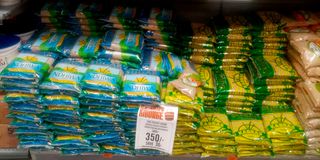Manufacturers raise goods prices by 9.2pc on higher taxes

Packets of sugar being sold at Naivas Supermarket in Nairobi on May 16, 2023. A kilogramme of sugar cost an average of Sh204.76 in June 2023, up from Sh129.55 in June last year.
Manufacturers slapped a 9.2 per cent price increase on their products in the 12 months to June underlining the impact of the rising cost of doing business amid higher taxation and as well as input costs.
Data released this week by the Kenya National Bureau of Statistics (KNBS) shows makers of food products such as maize flour, cooking oil, and bread raised their prices by 8.96 percent.
Companies, which make beverages such as juices and soda raised prices by 16.07 per cent during the period while those that produce chemicals made the sharpest prices increase of 44.05 per cent.
Electricity and gas supply rose by 39.87 per cent driven by the tariff increase by the Energy and Petroleum Regulatory Authority (Epra), which took effect in April leading to an increase in power prices of up to 63 per cent for some customer segments.
“Over the year, the industrial sectors namely: mining and quarrying; manufacturing; electricity, gas, steam, and air conditioning supply; and water supply, sewerage, waste management and remediation activities recorded varying changes in production prices,” said KNBS Director-General Macdonald Obudho.
The Producer Price Index (PPI) rose from 125.98 in June 2022 to 140.31 in June 2023. The index tracks the cost of goods at the factory’s warehouse for manufactured products and comes at a time firms have been hit with higher costs of inputs such as raw materials, labour, fuel, equipment and maintenance, and foreign currency costs.
“The electricity, gas, steam, and air conditioning supply sector recorded the highest price increase at 39.9 per cent in June 2023 followed by mining and quarrying at 12.1 per cent. Manufacturing recorded a price increase of 9.2 per cent during the same period,” he said.
Industrialists, under their lobby Kenya Association of Manufacturers (KAM), have been protesting over a hike in taxes such as excise duty and an increase in the cost of power, which had raised operational costs which are passed on to end users.
“Manufacturers have over time raised concerns over the high cost of electricity in the country, which impacts on the overall cost of production,” said KAM earlier this year.
High commodity prices are also scaring customers away as they reduce demand due to the squeeze on their pockets.
Stanbic Bank Kenya’s monthly Purchasing Managers’ Index (PMI) showed that businesses recorded reduced sales for the fifth month in a row last month, shedding fresh light on how the private sector performed in June.
“Firms widely reported a lack of purchasing power among customers due to high inflation and cash shortages. The overall fall wholly reflected weak domestic markets, as new export business rose for the fourth month running,” said the survey.
Inflation remained elevated at 7.9 per cent last month driven by high food, fuel, and electricity prices, according to KNBS, reducing the purchasing power of consumers.
Sugar is one of the leading drivers of food inflation, with a year-on-year inflation rate of 58.1 percent, 200kWh of electricity at 53.4 per cent, and maize grain at 30.7 per cent.
A kilogramme of sugar cost Sh204.76 on average in June 2023, up from Sh129.55 in June last year.





